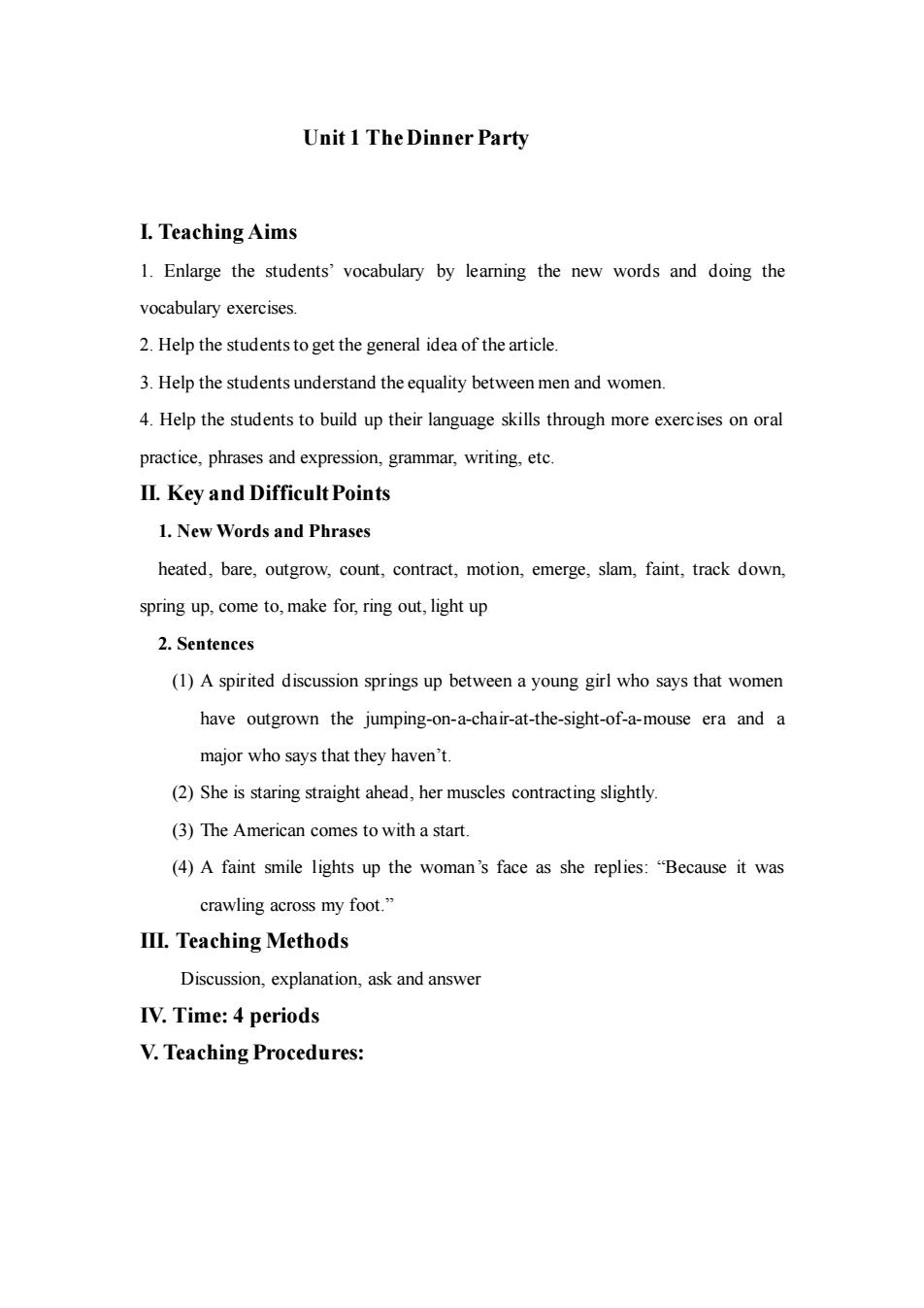
Unit 1 The Dinner Party I.Teaching Aims 1.Enlarge the students'vocabulary by leaming the new words and doing the vocabulary exercises. 2.Help the studentsto get the general idea of the article. 3.Help the students understand the equality between men and women 4.Help the students to build up their language skills through more exercises on oral practice,phrases and expression,grammar,writing,etc. II.Key and Difficult Points 1.New Words and Phrases heated,bare,outgrow,count,contract,motion,emerge,slam,faint,track down. spring up,come to,make for,ring out,light up 2.Sentences (1)A spirited discussion springs up between a young girl who says that women have outgrown the jumping-on-a-chair-at-the-sight-of-a-mouse era and a major who says that they haven't. (2)She is staring straight ahead,her muscles contracting slightly. (3)The American comes to with a start. (4)A faint smile lights up the woman's face as she replies:"Because it was crawling across my foot." III.Teaching Methods Discussion,explanation,ask and answer IV.Time:4 periods V.Teaching Procedures:
Unit 1 The Dinner Party I. Teaching Aims 1. Enlarge the students’ vocabulary by learning the new words and doing the vocabulary exercises. 2. Help the students to get the general idea of the article. 3. Help the students understand the equality between men and women. 4. Help the students to build up their language skills through more exercises on oral practice, phrases and expression, grammar, writing, etc. II. Key and Difficult Points 1. New Words and Phrases heated, bare, outgrow, count, contract, motion, emerge, slam, faint, track down, spring up, come to, make for, ring out, light up 2. Sentences (1) A spirited discussion springs up between a young girl who says that women have outgrown the jumping-on-a-chair-at-the-sight-of-a-mouse era and a major who says that they haven’t. (2) She is staring straight ahead, her muscles contracting slightly. (3) The American comes to with a start. (4) A faint smile lights up the woman’s face as she replies: “Because it was crawling across my foot.” III. Teaching Methods Discussion, explanation, ask and answer IV. Time: 4 periods V. Teaching Procedures:
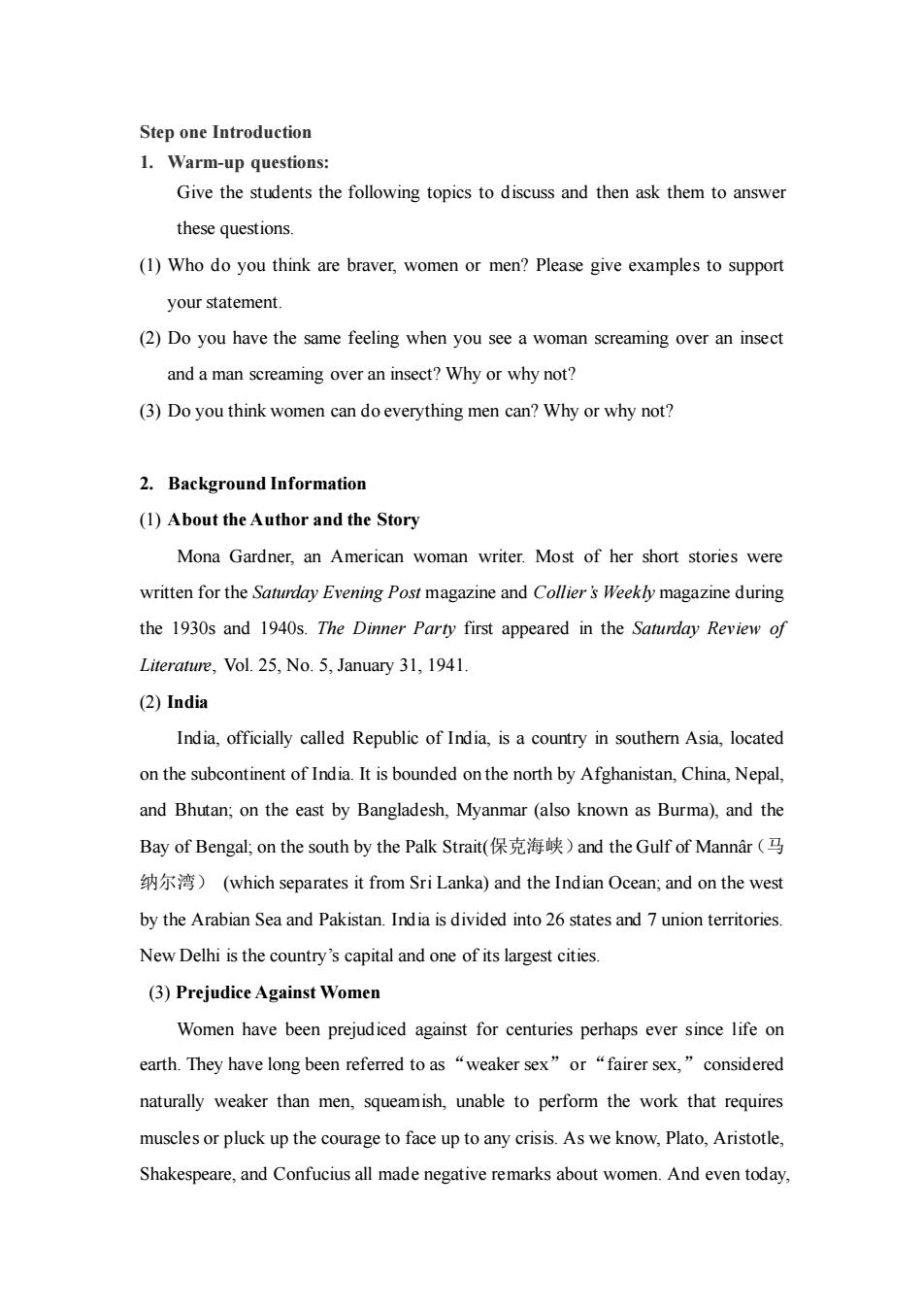
Step one Introduction 1.Warm-up questions: Give the students the following topics to discuss and then ask them to answer these questions (1)Who do you think are braver,women or men?Please give examples to support your statement. (2)Do you have the same feeling when you see a woman screaming over an insect and a man screaming over an insect?Why or why not? (3)Do you think women can do everything men can?Why or why not? 2.Background Information (1)About the Author and the Story Mona Gardner,an American woman writer.Most of her short stories were written for the Satrday Evening Post magazine and Collier Weekly magazine during the 1930s and 1940s.The Dinner Party first appeared in the Saturday Review of Literature,Vol.25,No.5,January 31,1941. (2)India India,officially called Republic of India,is a country in southem Asia,located on the subcontinent of India.It is bounded on the north by Afghanistan,China,Nepal, and Bhutan;on the east by Bangladesh,Myanmar(also known as Burma),and the Bay of Bengal;on the south by the Palk Strait((保克海峡)and the Gulf of Mannar(马 )(which separates it from Sri Lanka)and the Indian Ocean,and on the west by the Arabian Sea and Pakistan.India is divided into 26 states and 7 union territories. New Delhi is the country's capital and one of its largest cities. (3)Prejudice Against Women Women have been prejudiced against for centuries perhaps ever since life on earth.They have long been referred to as“weaker sex”or“fairer sex,”considered naturally weaker than men,squeamish,unable to perform the work that requires muscles or pluck up the courage to face up to any crisis.As we know,Plato,Aristotle. Shakespeare,and Confucius all made negative remarks about women.And even today
Step one Introduction 1. Warm-up questions: Give the students the following topics to discuss and then ask them to answer these questions. (1) Who do you think are braver, women or men? Please give examples to support your statement. (2) Do you have the same feeling when you see a woman screaming over an insect and a man screaming over an insect? Why or why not? (3) Do you think women can do everything men can? Why or why not? 2. Background Information (1) About the Author and the Story Mona Gardner, an American woman writer. Most of her short stories were written for the Saturday Evening Post magazine and Collier’s Weekly magazine during the 1930s and 1940s. The Dinner Party first appeared in the Saturday Review of Literature, Vol. 25, No. 5, January 31, 1941. (2) India India, officially called Republic of India, is a country in southern Asia, located on the subcontinent of India. It is bounded on the north by Afghanistan, China, Nepal, and Bhutan; on the east by Bangladesh, Myanmar (also known as Burma), and the Bay of Bengal; on the south by the Palk Strait(保克海峡)and the Gulf of Mannâr(马 纳尔湾) (which separates it from Sri Lanka) and the Indian Ocean; and on the west by the Arabian Sea and Pakistan. India is divided into 26 states and 7 union territories. New Delhi is the country’s capital and one of its largest cities. (3) Prejudice Against Women Women have been prejudiced against for centuries perhaps ever since life on earth. They have long been referred to as “weaker sex”or “fairer sex,”considered naturally weaker than men, squeamish, unable to perform the work that requires muscles or pluck up the courage to face up to any crisis. As we know, Plato, Aristotle, Shakespeare, and Confucius all made negative remarks about women. And even today
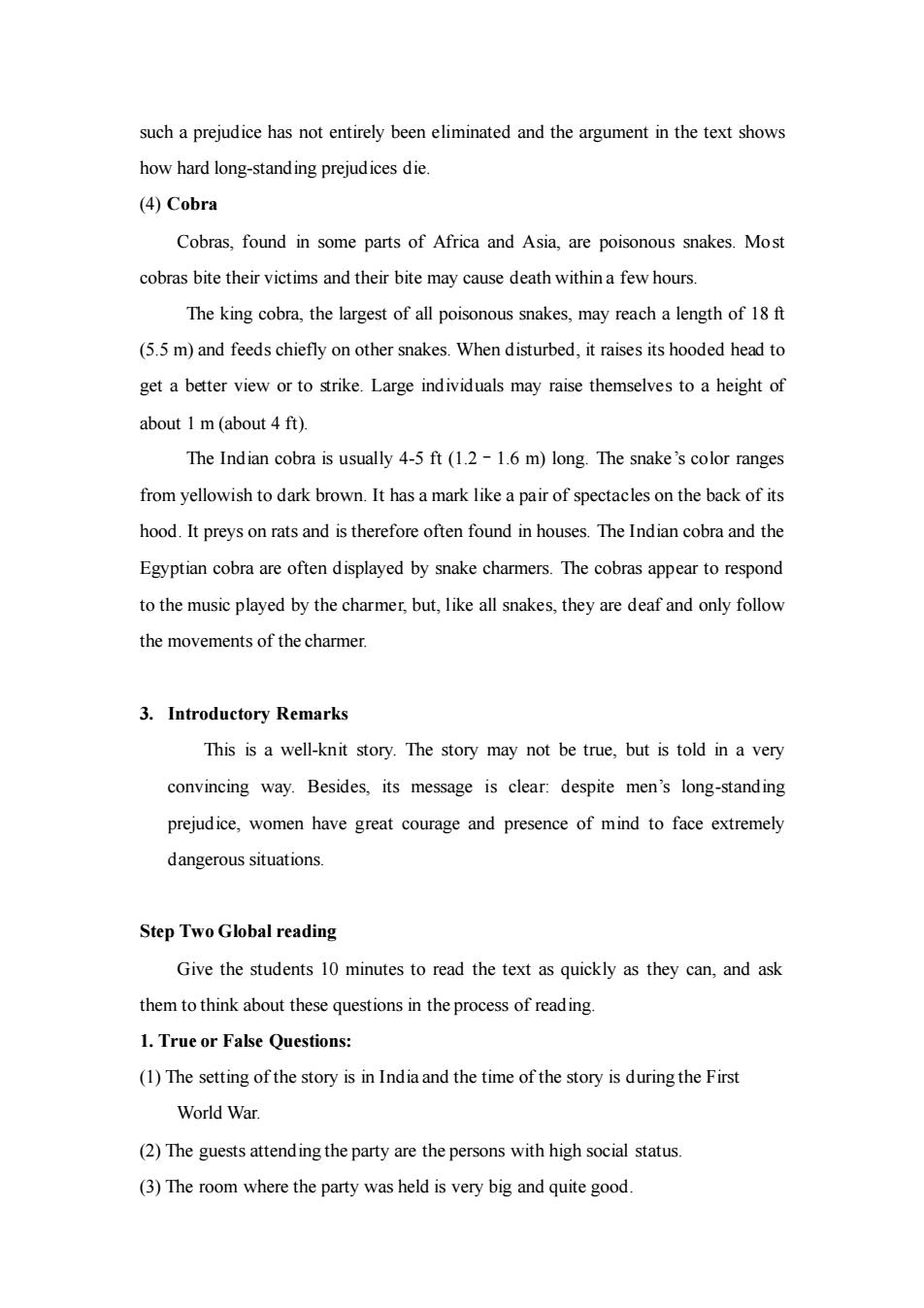
such a prejudice has not entirely been eliminated and the argument in the text shows how hard long-standing prejudices die. (4)Cobra Cobras,found in some parts of Africa and Asia,are poisonous snakes.Most cobras bite their victims and their bite may cause death within a few hours. The king cobra,the largest of all poisonous snakes,may reach a length of 18 ft (5.5 m)and feeds chiefly on other snakes.When disturbed,it raises its hooded head to get a better view or to strike.Large individuals may raise themselves to a height of about 1 m(about 4 ft). The Indian cobra is usually 4-5 ft(1.2-1.6 m)long.The snake's color ranges from yellowish to dark brown.It has a mark like a pair of spectacles on the back of its hood.It preys on rats and is therefore often found in houses.The Indian cobra and the Egyptian cobra are often displayed by snake charmers.The cobras appear to respond to the music played by the charmer,but,like all snakes,they are deaf and only follow the movements of the charmer. 3.Introductory Remarks This is a well-knit story.The story may not be true,but is told in a very convincing way.Besides,its message is clear:despite men's long-standing prejudice,women have great courage and presence of mind to face extremely dangerous situations. Step Two Global reading Give the students 10 minutes to read the text as quickly as they can,and ask them to think about these questions in the process of reading. 1.Trueor False Questions: (1)The setting of the story is in India and the time of the story is during the First World War. (2)The guests attending the party are the persons with high social status (3)The room where the party was held is very big and quite good
such a prejudice has not entirely been eliminated and the argument in the text shows how hard long-standing prejudices die. (4) Cobra Cobras, found in some parts of Africa and Asia, are poisonous snakes. Most cobras bite their victims and their bite may cause death within a few hours. The king cobra, the largest of all poisonous snakes, may reach a length of 18 ft (5.5 m) and feeds chiefly on other snakes. When disturbed, it raises its hooded head to get a better view or to strike. Large individuals may raise themselves to a height of about 1 m (about 4 ft). The Indian cobra is usually 4-5 ft (1.2–1.6 m) long. The snake’s color ranges from yellowish to dark brown. It has a mark like a pair of spectacles on the back of its hood. It preys on rats and is therefore often found in houses. The Indian cobra and the Egyptian cobra are often displayed by snake charmers. The cobras appear to respond to the music played by the charmer, but, like all snakes, they are deaf and only follow the movements of the charmer. 3. Introductory Remarks This is a well-knit story. The story may not be true, but is told in a very convincing way. Besides, its message is clear: despite men’s long-standing prejudice, women have great courage and presence of mind to face extremely dangerous situations. Step Two Global reading Give the students 10 minutes to read the text as quickly as they can, and ask them to think about these questions in the process of reading. 1. True or False Questions: (1) The setting of the story is in India and the time of the story is during the First World War. (2) The guests attending the party are the persons with high social status. (3) The room where the party was held is very big and quite good
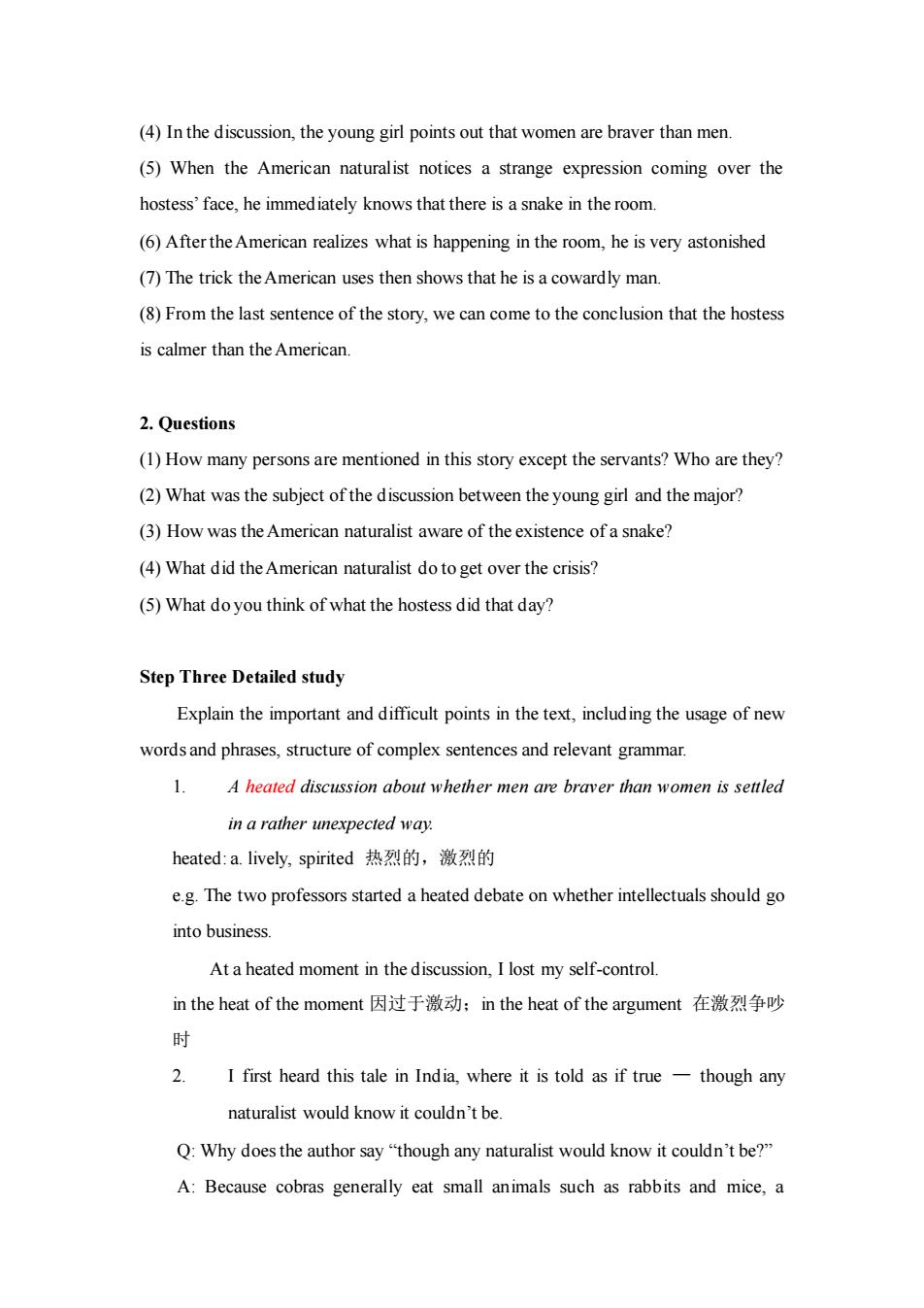
(4)In the discussion,the young girl points out that women are braver than men. (5)When the American naturalist notices a strange expression coming over the hostess'face,he immediately knows that there is a snake in the room (6)Afterthe American realizes what is happening in the room,he is very astonished (7)The trick the American uses then shows that he is a cowardly man. (8)From the last sentence of the story,we can come to the conclusion that the hostess is calmer than the American 2.Questions (1)How many persons are mentioned in this story except the servants?Who are they? (2)What was the subject of the discussion between the young girl and the major? (3)How was the American naturalist aware of the existence ofa snake? (4)What did the American naturalist do toget over the crisis? (5)What do you think of what the hostess did that day? Step Three Detailed study Explain the important and difficult points in the text,including the usage of new words and phrases,structure of complex sentences and relevant grammar 1.A heated discussion about whether men are braver than women is settled in a rather unexpected way. heated:a.lively,spirited热烈的,激烈的 e.g.The two professors started a heated debate on whether intellectuals should go into business. Ata heated moment in the discussion,I lost my self-control. in the heat of the moment因过于激动:in the heat of the argument在激烈争吵 时 2.I first heard this tale in India,where it is told as if true -though any naturalist would know it couldn't be. Q:Why does the author say"though any naturalist would know it couldn't be?" A:Because cobras generally eat small animals such as rabbits and mice,a
(4) In the discussion, the young girl points out that women are braver than men. (5) When the American naturalist notices a strange expression coming over the hostess’ face, he immediately knows that there is a snake in the room. (6) After the American realizes what is happening in the room, he is very astonished (7) The trick the American uses then shows that he is a cowardly man. (8) From the last sentence of the story, we can come to the conclusion that the hostess is calmer than the American. 2. Questions (1) How many persons are mentioned in this story except the servants? Who are they? (2) What was the subject of the discussion between the young girl and the major? (3) How was the American naturalist aware of the existence of a snake? (4) What did the American naturalist do to get over the crisis? (5) What do you think of what the hostess did that day? Step Three Detailed study Explain the important and difficult points in the text, including the usage of new words and phrases, structure of complex sentences and relevant grammar. 1. A heated discussion about whether men are braver than women is settled in a rather unexpected way. heated: a. lively, spirited 热烈的,激烈的 e.g. The two professors started a heated debate on whether intellectuals should go into business. At a heated moment in the discussion, I lost my self-control. in the heat of the moment 因过于激动;in the heat of the argument 在激烈争吵 时 2. I first heard this tale in India, where it is told as if true — though any naturalist would know it couldn’t be. Q: Why does the author say “though any naturalist would know it couldn’t be?” A: Because cobras generally eat small animals such as rabbits and mice, a
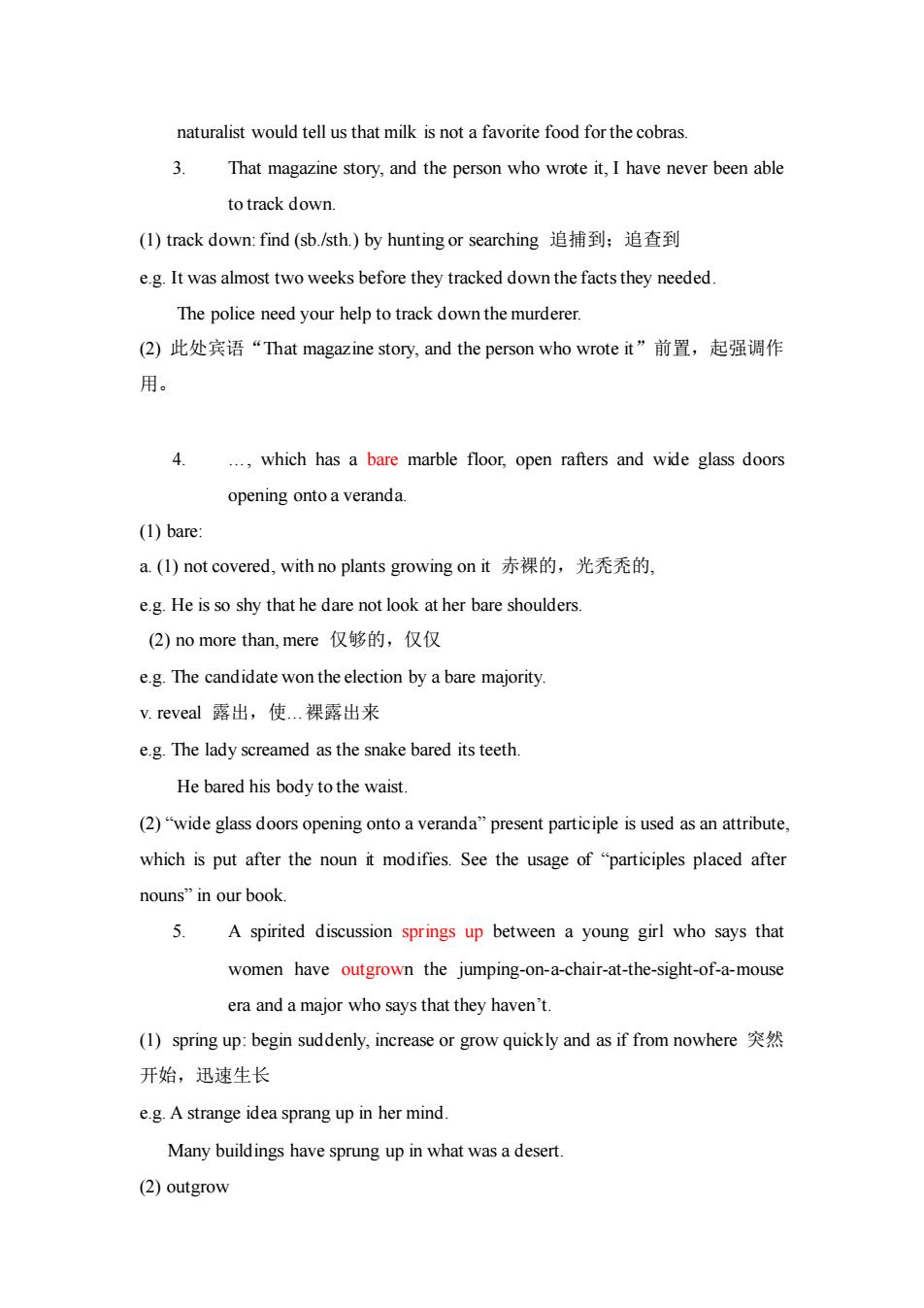
naturalist would tell us that milk is not a favorite food for the cobras. 3.That magazine story,and the person who wrote it,I have never been able to track down. (I)track down:find(sb.sth)by hunting or searching追捕到:追查到 e.g.It was almost two weeks before they tracked down the facts they needed. The police need your help to track down the murderer. (2)此处宾语“That magazine story,.and the person who wrote it”前置,起强调作 用。 g ...which has a bare marble floor,open rafters and wide glass doors opening onto a veranda (1)bare: a.(l)not covered,with no plants growing on it赤裸的,光秃秃的, e.g.He is so shy that he dare not look at her bare shoulders (2)no more than,mere仅够的,仅仅 e.g.The candidate won theelection by a bare majority. v.reveal露出,使..棵露出来 e.g.The lady screamed as the snake bared its teeth He bared his body to the waist. (2)"wide glass doors openingonto a veranda"present participle is used as an attribute. which is put after the noun it modifies.See the usage of"participles placed after nouns'”in our book 5.A spirited discussion springs up between a young girl who says that women have outgrown the jumping-on-a-chair-at-the-sight-of-a-mouse era and a major who says that they haven't (1)spring up:begin suddenly,increase or grow quickly and as if from nowhere 开始,迅速生长 e.g.A strange idea sprang up in her mind Many buildings have sprung up in what was a desert (2)outgrow
naturalist would tell us that milk is not a favorite food for the cobras. 3. That magazine story, and the person who wrote it, I have never been able to track down. (1) track down: find (sb./sth.) by hunting or searching 追捕到;追查到 e.g. It was almost two weeks before they tracked down the facts they needed. The police need your help to track down the murderer. (2) 此处宾语“That magazine story, and the person who wrote it”前置,起强调作 用。 4. …, which has a bare marble floor, open rafters and wide glass doors opening onto a veranda. (1) bare: a. (1) not covered, with no plants growing on it 赤裸的,光秃秃的, e.g. He is so shy that he dare not look at her bare shoulders. (2) no more than, mere 仅够的,仅仅 e.g. The candidate won the election by a bare majority. v. reveal 露出,使…裸露出来 e.g. The lady screamed as the snake bared its teeth. He bared his body to the waist. (2) “wide glass doors opening onto a veranda” present participle is used as an attribute, which is put after the noun it modifies. See the usage of “participles placed after nouns” in our book. 5. A spirited discussion springs up between a young girl who says that women have outgrown the jumping-on-a-chair-at-the-sight-of-a-mouse era and a major who says that they haven’t. (1) spring up: begin suddenly, increase or grow quickly and as if from nowhere 突然 开始,迅速生长 e.g. A strange idea sprang up in her mind. Many buildings have sprung up in what was a desert. (2) outgrow